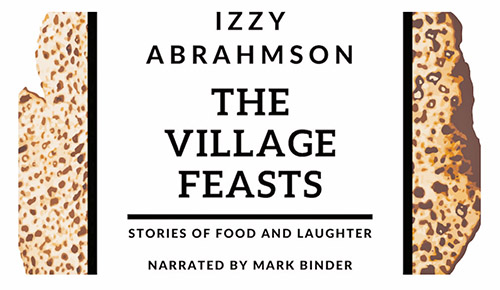
Highlighting: “The Village Feasts” by Izzy Abramson. Light Publications. 2022. Paperback. 104 pages. ISBN-13:
978-1940060453.
If you’re concerned about how your Passover Seders will go this year, take heart: It could always be worse. No, really, it could be much, much worse. Consider, for example, Mrs. Chaipul’s matzah balls, or better, consider the poor souls to have to eat the culinary tragedies they call Stones of Affliction, shot puts, and cast iron. It’s said, and I suppose this is meant as a compliment, that if the pyramids had been built with the dough from Mrs. Chaipul’s matzah balls, more of them would be standing today.
And yet—it’s Mrs. Chaipul’s matzah balls that save the day in “Mrs. Chaipul’s Lead Sinker Matzah Balls,” one of 10 silly, charming, whimsical, big-hearted stories in the new book “The Village Feasts” by Mark Binder, writing under the name Izzy Abramson. It’s the latest in Abramson’s delightful “Village Life” series and, if you haven’t yet had the good fortune to come across them, search them out in stores and on Amazon, Kindle, iBooks and Google Play. You’re in for a treat.
This one is a Passover treat, because all the stories in “The Village Feasts” are set in and around Passover. For example, there’s “Mega Matzah Mishugas,” in which Reb Stein, the village baker, invents matzah by accident, then sets out to bake the world’s largest matzah. It’s not easy because, as Abramson explains, “One of the czars, Fyodor, The Not So Great, had commissioned, from the bakers in Moscow, an unleavened bread the size of a tabletop. Jews in London had once witnessed a hamotzi over a matzah as big as a horse cart. And it was rumored that in Jerusalem bakers had been developing for centuries a secret recipe that they claimed would permit them to rebuild the Holy Temple completely out of matzah within a week, if the Messiah should ever come and call for it.”
Reb Stein’s matzah requires four banquet tables to support it and 14 bedsheets to cover it. And it finally gets used as … but that would be spoilers.
Then there’s the Seder dinner made entirely out of cabbage: cabbage matzah, cabbage ball soup, chopped cabbage liver, poached cabbage, braised cabbage, and cabbage charoset. Believe it or not, this story comes complete with a real recipe for cabbage matzah.
There’s so much more here to relish before, or during, your Seder, like the unexpected origin story for one of the world’s most familiar haggadahs, a cookbook made up of 1,400 recipes whose only ingredients are matzah meal and potato starch in various combinations, and the sad but comic predicament of a rabbi who unintentionally finds himself in a bakery filled with scrumptious masterpieces of the baker’s art—in the middle of Passover.
And there’s Abramson’s riff on what he presents as a real excerpt from a letter by Mark Twain, briefly mentioning Twain’s visit to a small, presumably European, village. (I hope I wasn’t taken in by this.) Abramson imagines what might have happened if Twain’s visit was in fact to the hometown of Mrs. Chaipul, Reb Stein, and the rest.
Which is as good a place as any to tell you that you’ve likely heard of the village at the heart of “The Village Feasts.” It’s Chelm, the legendary town of fools. But this is no Chelm you’ve ever visited before. In Abramson’s telling, it’s a village with “more chickens than people and a wealth of love, lore, misadventures and often silliness.” You empathize with these Chelmeners, rather than mock them.
Another quality that makes these stories so appealing and engaging is that they evoke the charm of traditional folktales. Much of this comes, I suspect, from Binder’s other day job, as an accomplished storyteller. He’s an Audie Award-nominated performer who studied storytelling with the legendary Spalding Gray, trained as an actor and playwright, and performs an average of 100 shows a year, both in the U.S. and internationally.
Storytelling requires the performer to keep the audience’s interest and get to the point lest the audience get bored. It eschews lengthy description and interior monologue for action, emotion, humor and suspense. All of these are characteristic too of traditional folktales which, after all, were told and retold orally for generations before they were written down and became fixed stories.
Each story in “The Village Feasts” contributes to a perfect Passover confection. As the village’s Rabbi Kibitz often says at dinnertime: “The brisket is tender. The kasha is toothsome. The gravy is good. Together, they are delicious.”
Mark Levenson’s novel, “The Hidden Saint,” is just out from Level Best Books.













